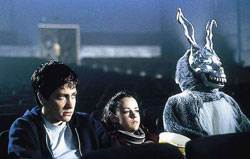
The film stars a young Jake Gyllenhaal as the title character Donnie Darko. Donnie is a disturbed and odd teenage boy living in the suburbs during the late 1980's. His father is a hard-nosed Republican while his mother simply wishes for everyone to get along long enough to make it through dinner. Donnie experiences episodes while sleeping in which he wanders to different locations throughout his town. During these trances, he is visited by a demonic rabbit who warns him of an impending disaster which will occur at the end of the month.
At school Donnie, like most students is bored and irritated by the idiocy in which teachers treat their students. Only two teachers are able to draw his attention, Ms. Pomeroy (Drew Barrymore) and Professor Monnitoff (Noah Wyle). Both teachers clearly wish to push the boundaries of what can be taught to students but tackling various subjects. At the same time, Donnie's night time visitations take a dramatic turn when he begins committing a series of crimes unbeknownst to everyone, including himself. Back at school, Donnie begins looking for explanations for his visions and discovers a book titled "The Philosophy of Time Travel". It helps him navigate the dark dreams and possibly decipher what is coming.
As the month marches towards its final days Donnie realizes he is helpless to resist the coming tide and when the time finally comes, he succumbs to the hand of fate and accepts his destiny by making the ultimate sacrifice.
Clearly, even from this brief explanation, the film goes deeper than the mere plot that is plastered in front of us. Any keen observer will note moments in the film, and especially on the director's cut, where certain questions are raised as to the nature of reality, time and even existence. One scene that strikes out amongst the rest is during a conversation Donnie has with Professor Monnitoff. Donnie, after reading some of the time travel book mentioned before, has some questions for his Professor. During their discussion, Donnie becomes more and more excited, and eventually, brings up the possible existence of God. It is at this point that his Professor ends the discussion because going any further could cost him his job.
It is always interesting and satisfying as a moviegoer to witness a film that doesn't simply go through the basic formula of plot that we've come to expect from Hollywood. That is what we got with Donnie Darko; true there were certainly films that came before it that attempted similar themes. But only a few did so through the vein of science fiction. Probably the only other that stands out in the past 30 years is Blade Runner, which questions the nature of existence when a man is finally able to create life in his own image. After Donnie Darko, there have been films and TV shows that attempted to do what it did. The Matrix trilogy touched upon similar themes of existence and reality but lost its audience to bombastic special effects. Another example is Lost, but again, what started off as an interesting concept simply could not stand up to its own hype and by the end simply gave into type.
In the world we live in today it is beyond easy to simply plod through our day-to-day lives without any thought to what is beyond our realm of understanding. This is where books, and even film, play a key role. As humans living in this age of instant access and ready-made answers we must force ourselves to step back from our reality for how long we can and allow our minds to ponder the larger questions. In truth Donnie Darko, so far, has been the only film to tell a true mystery and leave the answers for the audience to decide which is what makes for a transformative experience. It was once said that a question with an answer is a good thing but to be posed a question that has no definite answer and to formulate our own answers from that question is what makes living worth every moment.



